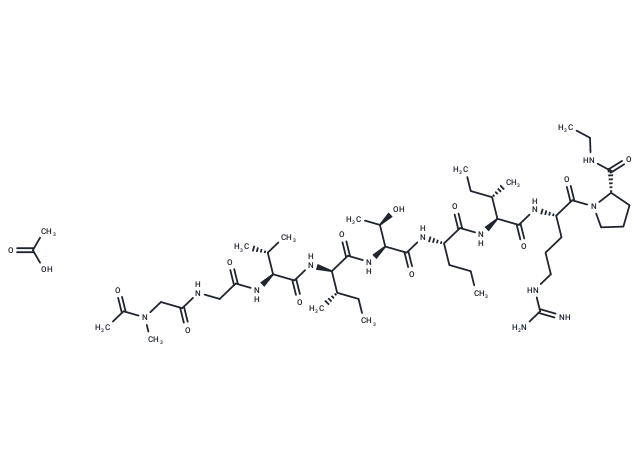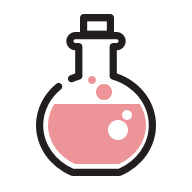- Remove All
 Your shopping cart is currently empty
Your shopping cart is currently empty
Shopping Cart
ABT-510 acetate
Catalog No. T24997Cas No. 442526-87-6
Alias ABT 510 acetate
ABT-510 acetate is an endogenous anti-angiogenic TSP peptide inhibitor, a thrombospondin analog, with anti-inflammatory, anti-cancer and anti-angiogenic activity that induces apoptosis and inhibits ovarian tumor growth in an orthotopic, syngeneic model of epithelial ovarian cancer.ABT-510 acetate reduces angiogenesis and inflammatory responses in a mouse model of inflammatory bowel disease. ABT-510 acetate reduces angiogenesis and inflammation in mouse models of inflammatory bowel disease (IBD) and can be used in cancer research, particularly in epithelial ovarian cancer, as well as in inflammatory bowel disease (IBD).

ABT-510 acetate
Catalog No. T24997Alias ABT 510 acetateCas No. 442526-87-6
ABT-510 acetate is an endogenous anti-angiogenic TSP peptide inhibitor, a thrombospondin analog, with anti-inflammatory, anti-cancer and anti-angiogenic activity that induces apoptosis and inhibits ovarian tumor growth in an orthotopic, syngeneic model of epithelial ovarian cancer.ABT-510 acetate reduces angiogenesis and inflammatory responses in a mouse model of inflammatory bowel disease. ABT-510 acetate reduces angiogenesis and inflammation in mouse models of inflammatory bowel disease (IBD) and can be used in cancer research, particularly in epithelial ovarian cancer, as well as in inflammatory bowel disease (IBD).
| Pack Size | Price | Availability | Quantity |
|---|---|---|---|
| 1 mg | $54 | In Stock | |
| 5 mg | $128 | In Stock | |
| 10 mg | $193 | In Stock | |
| 25 mg | $327 | In Stock | |
| 50 mg | $489 | In Stock | |
| 100 mg | $713 | In Stock |
Bulk & Custom
Add to Cart
Questions
View MoreSelect Batch
Purity:95.07%
Contact us for more batch information
All TargetMol products are for research purposes only and cannot be used for human consumption. We do not provide products or services to individuals. Please comply with the intended use and do not use TargetMol products for any other purpose.Product Introduction
Bioactivity
Chemical Properties
| Description | ABT-510 acetate is an endogenous anti-angiogenic TSP peptide inhibitor, a thrombospondin analog, with anti-inflammatory, anti-cancer and anti-angiogenic activity that induces apoptosis and inhibits ovarian tumor growth in an orthotopic, syngeneic model of epithelial ovarian cancer.ABT-510 acetate reduces angiogenesis and inflammatory responses in a mouse model of inflammatory bowel disease. ABT-510 acetate reduces angiogenesis and inflammation in mouse models of inflammatory bowel disease (IBD) and can be used in cancer research, particularly in epithelial ovarian cancer, as well as in inflammatory bowel disease (IBD). |
| In vitro | ABT-510 acetate (1, 5, 10, 20, 50 nM; 24 h) induces apoptosis in ID 8 cells and increases apoptosis incidence in human epithelial cancer cell lines SKOV3, OVCAR3, and CAOV3.[1] ABT-510 acetate (0-10 μM; 7 days) inhibits NO-stimulated growth and invasion of vascular cells into the extracellular matrix and blocks tumor-driven vascular cell growth, NO-driven cGMP flux, and CD36-mediated fatty acid uptake.[3] |
| In vivo | ABT-510 acetate (100 mg/kg; i.p.; once daily for 90 days) induces apoptosis in vivo and significantly reduces epithelial ovarian tumor size, ascites volume, and secondary lesion spread in mice.[1] ABT-510 acetate (60 mg/kg; subcutaneous osmotic minipump; once daily for 7 days) reduces angiogenesis and inflammation in a mouse model of inflammatory bowel disease.[2] |
| Alias | ABT 510 acetate |
| Molecular Weight | 1054.28 |
| Formula | C48H87N13O13 |
| Cas No. | 442526-87-6 |
| Smiles | C(C)(O)=O.C([C@@H](NC([C@@H](NC([C@@H](NC([C@@H](NC([C@H](NC([C@@H](NC(CNC(CN(C(C)=O)C)=O)=O)[C@H](C)C)=O)[C@H](CC)C)=O)[C@@H](C)O)=O)CCC)=O)[C@H](CC)C)=O)CCCNC(=N)N)(=O)N1[C@H](C(NCC)=O)CCC1 |
| Relative Density. | no data available |
Storage & Solubility Information
| Storage | keep away from moisture | Powder: -20°C for 3 years | In solvent: -80°C for 1 year | Shipping with blue ice. | ||||||||||||||||||||||||||||||
| Solubility Information | H2O: 90.0 mg/mL (85.4 mM), Sonication is recommended. | ||||||||||||||||||||||||||||||
Solution Preparation Table | |||||||||||||||||||||||||||||||
H2O
| |||||||||||||||||||||||||||||||
Calculator
In Vivo Formulation Calculator (Clear solution)
Please enter your animal experiment information in the following box and click Calculate to obtain the mother liquor preparation method and in vivo formula preparation method:
Mother liquor preparation method: 2 mg of drug dissolved in 50 μL DMSO (mother liquor concentration of 40 mg/mL), if you need to configure a concentration that exceeds the solubility of the product, please contact us first.
(mother liquor concentration of 40 mg/mL), if you need to configure a concentration that exceeds the solubility of the product, please contact us first.
Preparation method for in vivo formula: Take 50 μL DMSO main solution, add 300 μLPEG300
main solution, add 300 μLPEG300 mix well and clarify, then add 50 more μL Tween 80, mix well and clarify, then add 600 more μLddH2O
mix well and clarify, then add 50 more μL Tween 80, mix well and clarify, then add 600 more μLddH2O mix well and clarify
mix well and clarify
For Reference Only. Please develop an appropriate dissolution method based on your laboratory animals and route of administration.
Dose Conversion
You can also refer to dose conversion for different animals. More Dose Conversion
Tech Support
Please see Inhibitor Handling Instructions for more frequently ask questions. Topics include: how to prepare stock solutions, how to store products, and cautions on cell-based assays & animal experiments, etc
Related Tags: buy ABT-510 acetate | purchase ABT-510 acetate | ABT-510 acetate cost | order ABT-510 acetate | ABT-510 acetate chemical structure | ABT-510 acetate in vivo | ABT-510 acetate in vitro | ABT-510 acetate formula | ABT-510 acetate molecular weight

Copyright © 2015-2025 TargetMol Chemicals Inc. All Rights Reserved.



